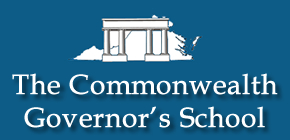Frequently Asked Questions
Question: Do regulations of the Commonwealth of Virginia require differentiated services for gifted students?
Answer: Yes.
Question: Is Commonwealth Governor’s School (CGS) the only program of its kind in Virginia?
Answer: CGS is 1 of 19 academic-year governor’s school programs in the Commonwealth of Virginia. The VA Department of Education (VDOE) also supports summer governor’s school programs at both a regional and state level.
Question: Do students need to be identified Gifted/FOCUS/SCOPE/TAG student in order to apply to CGS?
Answer: No. Students become candidates through a multi-criteria application process that includes: ability test scores, achievement test scores, grades, teacher recommendations, portfolio, and an interview.
Question: Does CGS offer a challenging program of studies?
Answer: YES! CGS offers academically talented and highly-motivated students a challenging, college-level, differentiated, interdisciplinary, academic program in English, Mathematics, Science, and Social Studies.
Question: How is CGS funded?
Answer: CGS receives additional state funding on a per-pupil basis. Over $1,000,000 additional state and grant funding is available for the region because of CGS.
Question: Is CGS a separate school?
Answer: No. CGS is a school-within-a-school program. Students spend half the day with their regional academic peers at a CGS site, and half the day at their home-based school. Students participate in home-based school classes, clubs, sports, fine arts activities, SCA, etc. Most CGS students report that they feel very connected to their home-based high schools.
Question: Can CGS students select which courses they wish to take?
Answer: No. CGS students participate in a four-year planned program of study that includes English, Mathematics, Science, and Social Studies. Algebra I is a prerequisite for rising 9th graders. Because geometry is not a prerequisite for CGS admission, math has a dual option strand.
Question: Is the CGS curriculum based on the Advanced Placement (AP) concept?
Answer: No. CGS incorporates AP recommended curriculum, but broadens it to incorporate interdisciplinary connections and the four CGS community pillars of technology, community of leaders, community outreach, curriculum and instruction focus. In 2019 (prior to Covid-19), CGS students took 1,226 AP exams in 12 subject areas through CGS. Over 74% of the exam scores were 3 or above. 41% of CGS candidate scores were 4 or 5. AP test scores (as well as SOL test scores) are credited to the home-based high school.
Question: Do CGS students go on field trips?
Answer: YES – the Virginia Department of Education requires that CGS students have field experiences.
Question: Are CGS students guaranteed high school valedictorian or salutatorian honors?
Answer: NO! It is likely that students participating in the CGS program will be candidates for valedictorian or salutatorian honors. The Class of 2021 had 7 valedictorians and 7 salutatorians who were CGS students. The opportunity to earn a high GPA is available to non-CGS students as well as CGS students.
Question: Do CGS students have time for a social life?
Answer: CGS students are normal teenagers. Most work very hard on their time management skills to enable them to maintain balanced academics, extracurricular activities, and social lives.
Question: Do many CGS students withdraw from the program?
Answer: No – approximately 10% of students have withdrawn in past years. New applicants fill vacated spaces. Students leave CGS for a variety of reasons, e.g., they feel more comfortable in a traditional structured learning environment; choose to use more of their time to pursue other goals or interests such as music, arts, drama, dance, sports, etc.; negative effect on GPA; not comfortable balancing CGS with home-based school activities; desire to select college-level courses in a single academic discipline; early graduation; moving; etc.
Question: How many courses do CGS teachers teach?
Answer: CGS teachers teach on a block schedule, plan in teams, have duties both at CGS and a home-based school. They participate in extended-hour learning activities after school, evenings, weekends, and during the summer. These activities include tutoring, AP test preps, enrichment activities, community outreach, and professional development. Approximately half of CGS teachers balance teaching responsibilities at a home-based high school and at CGS. The other half teach in CGS exclusively.
